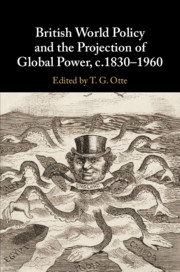Book contents
- British World Policy and the Projection of Global Power, c.1830–1960
- British World Policy and the Projection of Global Power, c.1830–1960
- Copyright page
- Dedication
- Contents
- Notes on the Contributors
- Preface and Acknowledgements
- Introduction: British World Policy and the White Queen’s Memory
- 1 The War Trade Intelligence Department and British Economic Warfare during the First World War
- 2 The British Empire and the Meaning of ‘Minimum Force Necessary’ in Colonial Counter-Insurgencies Operations, c.1857–1967
- 3 Yokohama for the British in the Late Nineteenth Century: A Hub for Imperial Defence and a Node of Influence for Change
- 4 ‘The Diplomatic Digestive Organ’: The Foreign Office As the Nerve Centre of Foreign Policy, c.1800–1940
- 5 Financial and Commercial Networks between Great Britain and South America during the Long Nineteenth Century
- 6 Britain through Russian Eyes: 1900–1914
- 7 Imperial Germany’s Naval Challenge and the Renewal of British Power
- 8 Views of War, 1914 and 1939: Second Thoughts
- 9 The Ambassadors, 1919–1939
- 10 The Tattered Ties that Bind: The Imperial General Staff and the Dominions, 1919–1939
- 11 Seeking a Family Consensus? Anglo-Dominion Relations and the Failed Imperial Conference of 1941
- 12 Imperial Hubs and their Limitations: British Assessments of Imposing Sanctions on Japan, 1937
- Index
7 - Imperial Germany’s Naval Challenge and the Renewal of British Power
Published online by Cambridge University Press: 06 September 2019
- British World Policy and the Projection of Global Power, c.1830–1960
- British World Policy and the Projection of Global Power, c.1830–1960
- Copyright page
- Dedication
- Contents
- Notes on the Contributors
- Preface and Acknowledgements
- Introduction: British World Policy and the White Queen’s Memory
- 1 The War Trade Intelligence Department and British Economic Warfare during the First World War
- 2 The British Empire and the Meaning of ‘Minimum Force Necessary’ in Colonial Counter-Insurgencies Operations, c.1857–1967
- 3 Yokohama for the British in the Late Nineteenth Century: A Hub for Imperial Defence and a Node of Influence for Change
- 4 ‘The Diplomatic Digestive Organ’: The Foreign Office As the Nerve Centre of Foreign Policy, c.1800–1940
- 5 Financial and Commercial Networks between Great Britain and South America during the Long Nineteenth Century
- 6 Britain through Russian Eyes: 1900–1914
- 7 Imperial Germany’s Naval Challenge and the Renewal of British Power
- 8 Views of War, 1914 and 1939: Second Thoughts
- 9 The Ambassadors, 1919–1939
- 10 The Tattered Ties that Bind: The Imperial General Staff and the Dominions, 1919–1939
- 11 Seeking a Family Consensus? Anglo-Dominion Relations and the Failed Imperial Conference of 1941
- 12 Imperial Hubs and their Limitations: British Assessments of Imposing Sanctions on Japan, 1937
- Index
Summary
Great Britain stood as the world’s leading sea power at the beginning of the twentieth century. The British Empire stretched around the globe, the homeland, dominions, and colonies linked together by a vast network of finance, trade, communications, and naval power. Britain’s leading role on the world stage, however, was threatened by rival Great Powers growing in industrial and naval strength. Defending against these rivals confronted British leaders with a daunting strategic problem. The famed scholar, academic leader, and policy commentator Sir Halford Mackinder asserted: ‘At this moment all the great Powers are building fleets.’ He warned: ‘Nature is ruthless, and we must build a Power able to contend on equal terms with other Powers, or step into the rank of the States which exist on sufferance.’ Gerard Fiennes, a well-informed journalist covering naval affairs, echoed Mackinder’s warning: ‘the task before the [British] Empire is colossal.
- Type
- Chapter
- Information
- Publisher: Cambridge University PressPrint publication year: 2019

